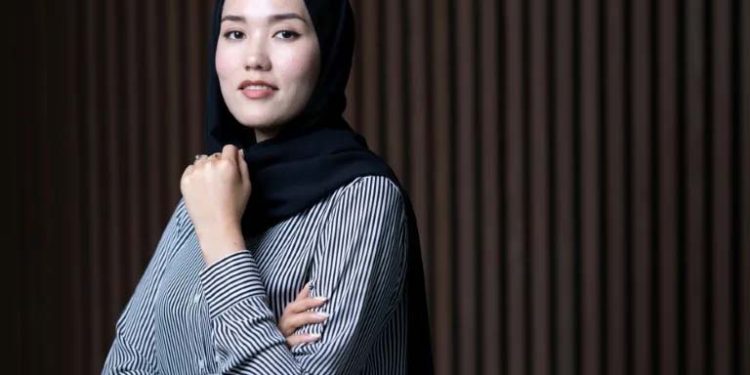Masomah Ali Zada is “proud” to represent “all those who have been forced to flee their country” in her role as chef de mission of the Refugee team at the Paris Olympics, she told AFP.
The 28-year-old Afghan has transferred seamlessly from Olympic cyclist for the Refugee team at the Tokyo 2020 Games to a managerial role and will be “the spokesperson for the 120 million displaced people round the world.”
Masomah will be in charge of 36 athletes hailing from 11 countries and competing across 12 sports at the Games which run from July 26 to August 11.
“It fills me with great ride and is an immense honour to represent, along with this unique and special team, those people who have been obliged to flee their country,” Masomah told AFP, speaking in French in a round of interviews at the Paris Games organisers’ headquarters to commemorate United Nations Refugees Day.
Masomah has achieved a lot in the eight years since she arrived in France, gaining the right of asylum after being refused a visa in her first application and she recently obtained her masters in civil engineering at Lille University.
Masomah can relate to the refugees having been one herself — she lived in Iran from the age of two to 10 before returning to Afghanistan.
“I know what it is to be a refugee,” said Masomah, her eyes highlighted by eyeliner and her head covered by a black veil.
“I had bad experiences, which led me to wonder whether I would ever be respected and it posed a lot of questions over my future.”
Masomah acknowledges she is in a better position than her female compatriots back in Afghanistan.
“When I compare my situation here, in France, where I can live and travel on my own, to that of Afghanistan-based women… I am sad and disappointed to be unable to do anything for them,” said a visibly emotional Masomah.
Since they returned to power in August, 2021, the Taliban has used its austere interpretation of Islam to erode women’s rights.
Women have been de facto barred from sports as part of rules based on the Taliban government’s strict interpretation of Islam that have restricted their access to public spaces such as parks and gyms, as well as education and certain jobs.
– ‘Any dream is possible’ –
Nevertheless Afghanistan will have a six-member team in Paris, three men and three women, after intense talks between the International Olympic Committee (IOC) and the Afghan National Olympic Committee.
The latter has told AFP that all but one of the six team members are based outside the country.
“I am so happy there will be three Afghan women and they will be equal with the men,” said Masomah, who added she will go along to cheer them on in their events.
Masomah, who belongs to the historically persecuted Hazara Shiite minority, said she experienced abuse and stigma when out on her bike in Afghanistan after she returned from Iran.
She said people would hurl stones and insults at her as she cycled at great speed around Kabul, but it only served to spur her on and she made the national team aged just 16.
“I grew up amid great inequality and insecurity,” she said.
“We lived in fear, but when I got on my bike I felt free. I forgot about problems.
“I had the impression I was empowered, when in Afghanistan one thinks women are incapable of doing certain things,” said Masomah, who finally left the country due to the hostility from the conservative elements of Afghan society.
Masomah, though, is keen to pursue a career in sport and one would not bet against her succeeding given how far her determination and courage has brought her so far.
“You must work really hard to fulfil your dream,” she said.
“I had to put in three times the effort of a French student: between learning the language, the university courses, and the sport.”
The fulfilment of her dream bore fruit in Tokyo.
“I lived my dream when the crowd cried out my name,” said Masomah, who came last in the time-trial, one of the rare events, due to Covid restrictions, which spectators were permitted to attend.
“After that I said to myself any dream is possible to realise because I was there.”
AFP




















